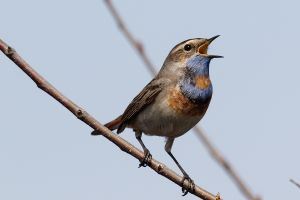 A new study published in Scientific Reports looked at whether bird songs can alleviate anxiety and paranoia in health participants.
A new study published in Scientific Reports looked at whether bird songs can alleviate anxiety and paranoia in health participants.
“The study is on the effects of environmental sounds on mental well-being,” study author Emil Stobbe told us. “Our physical environment can be categorized into natural and human-made (built/ urban) environments. Both of these surroundings contain auditory information that humans process in their daily life.”
The event of global urbanization across the past decades have resulted in a tendency for humans to spend most of their time in man-made (urban) environments which was originally different when humans lived in nature without the presence of urban influences, including an accumulation of human-made sound or noise.
“The research group of environmental neurosciences from the Max Planck Institute Berlin which I am a part of devoted several research projects to investigate the question which influence both types of environments have on the human brain,” Stobbe told us. “The current study investigated how listening to birdsongs affect mental well-being and cognitive performance compared to the sounds of city traffic.”
Mental well-being was assessed using anxiety, depression and paranoia state questionnaires which are used to investigate tendencies of these clinical concepts in healthy subjects. Cognitive performance was measured with two standard working memory tasks.
“We hypothesized to find differences in these outcomes after subjects had listened to either the birdsong or the traffic noise soundscapes of comparable length and sound diversity,” Stobbe told us. “In more detail, we hoped to find a beneficial effect for the birdsongs which would be in accordance with prior research showing the beneficial effect of natural audio-stimuli such as wind or water on mental well-being or cognitive performance.”
On the other hand, researchers expected that listening to the traffic noises would result in a disadvantageous effect in line with research showing that interaction with urban stimuli can have negative effects for mental health.
“Within the field of psychological impacts of the physical environment there are at least three prominent theories,” Stobbe told us. “We considered all of them when designing the present study.”
Stress reduction theory claims that natural landscapes with vegetation and water are beneficial to humans from an evolutionary perspective. According to this theory, humans still possess the innate tendency to benefit from surroundings that signal aspects relevant for survival.
Attention restoration theory on the other hand claims that natural landscapes contain “softly fascinating” stimuli which reduce the attentional demands of urban environments and allow for restoration of cognitive performance.
Conditioned restoration theory claims that humans form unconditioned positive responses when interacting with nature. Upon the presence of a similar natural cue, the original positive response is triggered.
“Based on these theoretical accounts, we hypothesized that a natural cue such as bird song will result in positive outcomes for our measurements on mental health,” Stobbe told us. “We chose this particular topic for the current experiment because we believe that studying soundscapes which humans come across during their daily life can be a promising approach to unravel their impacts on mental states and health.”
The Lise Meitner group for Environmental Neuroscience at the Max Planck Institute for Human Development is devoted to raising awareness about the interplay between humans and nature. Researchers aim to investigate the healing aspects of natural environments as well as studying the daily life impacts of human-made (urban) surroundings, including the human-made soundscapes.
“We tested our hypotheses within a classical pre/post between-subject intervention design,” Stobbe told us. “Subjects delivered reports on their current mental states and had to perform cognitive working-memory tasks.”
They were then subsequently exposed to different bird song or traffic noise soundscapes for six minutes. After the exposure the assessments for mental states and cognitive performance were repeated. In the analysis, researchers tested for statistical differences from pre-to-post measurement.
“Our results demonstrate that exposure to a bird song soundscape significantly reduced state anxiety and paranoia irrespective of the diversity of the birdsongs,” Stobbe told us. “The exposure to city traffic noise increased depressive states of the subjects especially if the soundscape involved many different sources of traffic noise. No effects were found with respect to the working memory performance (cognition).”
The researchers were not surprised by the results, however, they were intrigued by the fact that they were able to show that birdsong exposure positively affected states of paranoia which has not been shown before.
“Moreover, we were slightly surprised to not find any effects onto cognitive functioning, because previous studies have demonstrated that viewing of nature pictures or listening to natural soundscapes can be beneficial for working memory related tasks compared to urban stimuli,” Stobbe told us. “The positive nature of the results from the current study suggest that it may be worthwhile investigating the use of natural sounds in a clinical setting for example in hospital waiting rooms or in psychiatric settings.”
Listening to birdsong audio could additionally function as an easily accessible intervention to lower distress. Taken together the findings of the current study provide another facet of why interactions with nature can be beneficial for mental health, and it is highly important to preserve nature, explained Stobbe.
“Future studies should focus on investigating mixed soundscapes as well, for instance, whether the presence of natural sounds within an urban context can lower the stress-effects of, for instance, traffic noise.”
Patricia Tomasi is a mom, maternal mental health advocate, journalist, and speaker. She writes regularly for the Huffington Post Canada, focusing primarily on maternal mental health after suffering from severe postpartum anxiety twice. You can find her Huffington Post biography here. Patricia is also a Patient Expert Advisor for the North American-based, Maternal Mental Health Research Collective and is the founder of the online peer support group - Facebook Postpartum Depression & Anxiety Support Group - with over 1500 members worldwide. Blog: www.patriciatomasiblog.wordpress.com
Email: tomasi.patricia@gmail.com